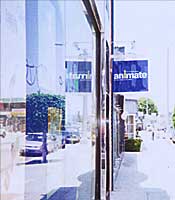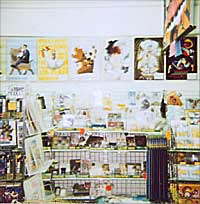by Luis Reyes
An ebbing economy and an expanding cost of living has encouraged more couples in Japan to forego large families or
have children at all. And the pervasion of education - especially among young women - and competition in the work place
- especially from young women - have pushed back life plans for many Japanese altogether. In this social climate, the
anime and manga market, aimed primarily at kids (despite a healthy catalogue of titles spread through every age level),
is beginning to suffer. Anime producers have already turned to the United States as a potential new market to take up
the slack. "Pokémon" bum rushed the kids market back in '96, followed by "Dragonball Z," "Digimon," and the upcoming
"Yu-Gi-Oh," among many others.
The US market has been such a boon for anime that Japanese producers, and even some animation studios, have begun
to set up shop in the US. Animation house APPP has established Super Techno Arts here in the states, and Production
I.G, Gonzo, and several other studios have at least placed a permanent representative in the US. Sailing in on these
coat tails, Japanese retail stores that specialize in anime merchandise have begun to do the like, mainly settling down
in Southern California. (The US has long been home to thousands of ma and pa anime outlets and small, US-based chain
stores that specialize in anime goods, but the emigration of well-known brand names signals wider exposure for anime and
manga.)
Scavenger outlet Mandarake, which specializes in used books, manga, anime cels, etc., found a home in Torrance,
just south of Los Angeles; Japan's colossal anime superstore Animate has set up shop on Melrose Blvd. in the middle of
West Hollywood; and, newest to the retail exodus, Broccoli's Gamers is about to open its doors to the public in West
Los Angeles.
Thematically, and modestly, placed in an enclosed mall adjacent a Mitsuwa grocers, Mandarake specializes in used
anime and manga merchandise. Their crude website boasts a list
of hot titles ensured to yield good re-sales prices. Reflecting the tastes of sincere fans of anime and manga rather
than the popular tastes of youthful America, the most popularly traded titles include "Vagabond," "Ayashi no Ceres" and
"Saiyuki." Mandarake has also recently included a mail order service to meet rising demand.
Animate USA envisions greater prominence for anime. "The Mandarake store is in Torrance, which is a good place to
sell anime," explains Animate USA general manager, Akira Yoshikawa. "But that's primarily for the Japanese or Asian
communities. I thought we should choose a place to reach the American mainstream audience."
Animate arrived in the US a year and half ago, transplanting it's successful Japanese business model into the
heart of Los Angeles. "I wanted to bring the exact same store from Japan to America," Yoshikawa notes. But he
acknowledges the need to adapt his store to fit American tastes. "There are titles that are famous in Japan but they
are not famous here. So we have to have 'Gundam Wing' merchandise, 'Dragonball.' I have to get product from American
companies to sell."
Launched in Ikebukuro, Tokyo in 1983, Animate has become the largest chain of anime and manga merchandise stores in
Japan, capturing exclusive product lines and creating a commercial environment which inspires fan communication. "We
have more than fifty stores in Japan, every big city has an Animate, and I would like to do that for the US."
Though the US store enjoys only flagging success and has experienced licensing snafus, Animate has stepped boldly
into one of the most high profile shopping districts in the world.
|


